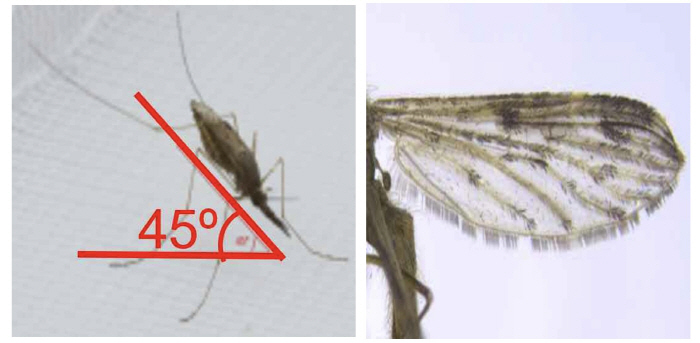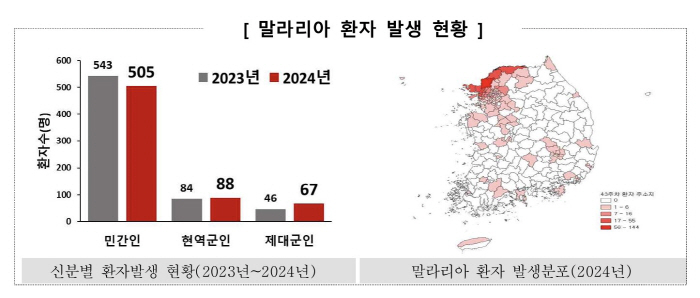2 discharged military malaria cases this month...Free examination after military personnel are discharged from the military in the border area
Apr 09, 2025
The first two malaria patients were found in discharged soldiers who served in Paju, Gyeonggi Province, and Cheorwon, Gangwon Province this month.
In this regard, the Korea Centers for Disease Control and Prevention and the Ministry of National Defense said, "If a soldier who served in the military in a border area experiences suspicious symptoms of malaria such as fever, headache or chills after discharge, he or she can receive a malaria rapid diagnostic kit (RDT) free of charge at public health centers or military hospitals nationwide," he said.
Domestic malaria is infected by being bitten by a mosquito infected with Plasmodium pylori (Chinese zebra mosquito), and symptoms appear up to two years after the protozoa lurks in the liver. Initial symptoms include fever, headache, and loss of appetite, and are characterized by repeated chills, fever, and fever every 48 hours.
Korea is a priority malaria eradication country designated by the World Health Organization (WHO).
More than 600 malaria patients occur annually in Korea, of which 150 soldiers (current and military soldiers) account for about 20% of all patients. In 2024, the number of malaria patients decreased by 38 from the previous year to 505, but the number of discharged soldiers increased by 21 from the previous year to 67.
As discharged soldiers are reported as patients in other regions after being infected with malaria in the border area, active management is needed to block community transmission.
The Korea Centers for Disease Control and Prevention said it is conducting free rapid diagnostic kit tests at public health centers (two years after discharge) for discharged soldiers who have symptoms of malaria since being discharged from the military, and the Ministry of National Defense is also conducting free malaria tests and treatment prescriptions at 14 military hospitals (one year after discharge). In addition, the Korea Centers for Disease Control and Prevention and the Ministry of Defense jointly provide malaria prevention education to prospective dischargeers and prescribe malaria prevention drugs to military personnel working in the border area during their service.
Ji Young-mi, Director of the Korea Centers for Disease Control and Prevention, said, `Military personnel in border areas should spray repellent to prevent mosquito bites during the main activity of malaria-borne mosquitoes (June-October) and use mosquito nets when sleeping outdoors, such as training"If you experience suspicious symptoms such as fever, headache, chills, etc. after being discharged from the military, you must visit a nearby public health center or military hospital and get tested for malaria."," he said.
In this regard, the Korea Centers for Disease Control and Prevention and the Ministry of National Defense said, "If a soldier who served in the military in a border area experiences suspicious symptoms of malaria such as fever, headache or chills after discharge, he or she can receive a malaria rapid diagnostic kit (RDT) free of charge at public health centers or military hospitals nationwide," he said.
|
|
More than 600 malaria patients occur annually in Korea, of which 150 soldiers (current and military soldiers) account for about 20% of all patients. In 2024, the number of malaria patients decreased by 38 from the previous year to 505, but the number of discharged soldiers increased by 21 from the previous year to 67.
As discharged soldiers are reported as patients in other regions after being infected with malaria in the border area, active management is needed to block community transmission.
The Korea Centers for Disease Control and Prevention said it is conducting free rapid diagnostic kit tests at public health centers (two years after discharge) for discharged soldiers who have symptoms of malaria since being discharged from the military, and the Ministry of National Defense is also conducting free malaria tests and treatment prescriptions at 14 military hospitals (one year after discharge). In addition, the Korea Centers for Disease Control and Prevention and the Ministry of Defense jointly provide malaria prevention education to prospective dischargeers and prescribe malaria prevention drugs to military personnel working in the border area during their service.
Ji Young-mi, Director of the Korea Centers for Disease Control and Prevention, said, `Military personnel in border areas should spray repellent to prevent mosquito bites during the main activity of malaria-borne mosquitoes (June-October) and use mosquito nets when sleeping outdoors, such as training"If you experience suspicious symptoms such as fever, headache, chills, etc. after being discharged from the military, you must visit a nearby public health center or military hospital and get tested for malaria."," he said.
This article was translated by Naver AI translator.















